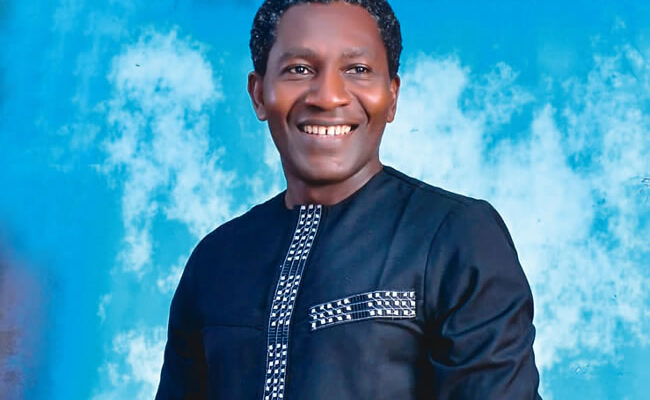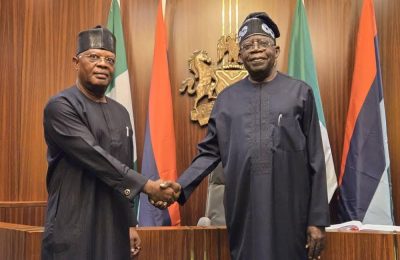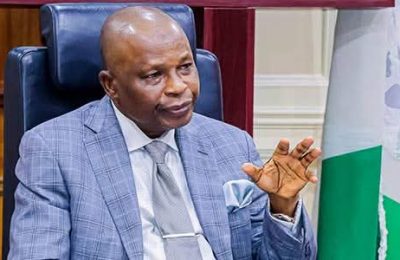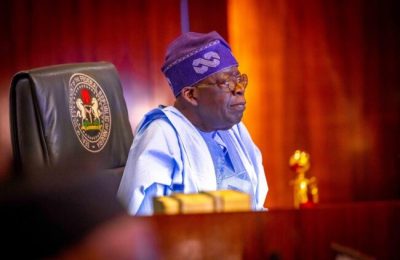
Mr. Olu Popoola joined the Ondo State Radio Corporation as a reporter and rose to become the General Manager of the Broadcasting Service of Ekiti State (BSES). In this interview by SAM NWAOKO, he tells part of his media story and the distinction in being a journalist in government employ.

Everybody has a starting point in their media journey. How did your own media journey start?
My media journey started when I joined the services of Ondo State Radio Corporation in 1996. I came for auditioning and they discovered that I had a good voice. From there, I was pushed to the newsroom. Of course, I didn’t have the professional certificate, so I had to enroll in International Institute of Journalism (IIJ) for further training, degree and certification. That was how I started. I began from the newsroom in the old Ondo State Radio Corporation, Akure in 1996.
Did you set out from the beginning to be a journalist or is it that journalism found you?
I studied English and Literary Studies at the Obafemi Awolowo University (OAU), Ile Ife. So, I was, kind of, toeing that line because I also listened to news casters on radio and TV, apart from reading many novels, etc. However, when I graduated, I was not particular about working in the broadcast industry. I was in Lagos but the hassles of Lagos were overwhelming me, so I left Lagos and returned to Ondo State. In Ondo State, I was informed that there was a recruitment going on. So I went. That was how it all started. Then, I went for my professional course and the passion came with it. I saw that journalism is a noble profession, a profession through which you mirror the society to mould the opinion of people to do the right thing and to take the right decisions.
Between 1996 and now, how has it been? There must have been a lot packed in between the years.
Like I said, it’s a noble profession and when I got deep into it and I saw the essence of the profession, I took a decision to remain there. It was fun and you are free. Apart from the assignment that you are given in the office which is always government assignments, programmes and events, you had the liberty to pick a leisure which you would focus on – a topic you will work on by beaming searchlight on for the good of the society. After you are done with the report, you watch out for the reaction and how it would impact on the society and bring about required societal changes. It was fun.
You said you were free to choose topics to work on as a way of impacting the society. What was yours?
There was one I was so emotional about. There was a boy I saw during a December period. The boy had mental health issues and was just lying in the middle of the road because, perhaps, the place was warm. I was passing by early in the morning and I saw him where he was. He called out to me in Yoruba and said he was hungry. It was so sad and touching. But I would not just be there ruing the situations so for starters, I got him something to eat. I took him to a government facility for people with such problems so they could attend to the boy. They declined and said that it was a weekend and that they didn’t admit patients at weekends. I felt it was not proper but there was nothing I could do. Then, I went back to the studio, put up a report about the boy. By the time the report was aired a few times, that was before afternoon of that same day, help came. The boy was rescued and things turned around for the boy.
Another one was a community that was in dire need of a particular project. We moved in, did a report and the government of the day reacted to the need accordingly. The aftermath was heartwarming indeed. The government did what was expected of it, and whenever I pass through that community and see that the project is useful to the people, you cannot but recollect. This gives a sense of fulfilment that journalism has done the people good and brought about positive change in the society.
However, it is always not smooth or good. There are the low sides. For instance, for those of us in government media organisations, it is not always rosy when people who are not core professionals and who are outside of the media space are brought in to administer government media outfits. It is not always a smooth experience. They try to tailor your trade; they would not want you to always ply your trade professionally but want to railroad you into doing what you shouldn’t have done as a media professional. The sad point is that they compel you to do what you don’t want to do and if eventually they lose out during power struggle, the new ones will come down on you as if it was your idea or decision initially. It is not an experience I would wish even my enemy to go through. That is on the down side.
In the midst of it all, you have risen to become the General Manager of your organisation. When you compare your experiences as a reporter and media manager, what are the stand out attributes you would point at?
As a reporter, you are there to report to inform, to educate, to entertain, etc. I talked about being free earlier on. As a reporter, you make your mistakes here and there and you learn along the line. You try to imbue a style and you want everything reflected in your work. The beauty of it and the outcome is that it is good to be a reporter. However, as the General Manager, the responsibilities are way different and are much higher. For instance, you have to think about the welfare of your staff members to start with. In our organisation I have the responsibility of over 200 members of staff on my neck. I have to take decisions that would not affect them negatively as much as possible. When I was a reporter, I can do my report and just go home but things are different now. Now I seldom sleep because I cannot afford to make mistakes. Right from recruitment, I cannot make recruitment error and I try as much as possible not to be high handed in such a way that it would not be obvious. Yet, you must maintain discipline. These people are the same people you have worked with for a long time and therefore, to maintain discipline and firmness, you must device a means of getting this done as effectively as required. It is a delicate balance and you have to strike that balance because the organisational goals and objectives must be achieved while you carry everybody along to achieve it.
Then, interfacing with the government is another thing completely. You don’t want to run afoul of government objectives and demands and at the same time, you have to keep your head as a professional in doing this. On yet another plane, you have to relate with the people, the grassroots people. You cannot go the side of the government so much as to do it to the detriment of what the people want and need. You have to strike the balance. It’s a whole lot. Sometimes I wish I was still that my reporter roaming the streets free.
Are there times you wish you were working in Lagos, Ibadan, Abuja or any of the big cities?
After my service year, I went to Lagos. It was the fad to go to Lagos as young people. When I got to Lagos, I discovered that it was not the kind of life I was used to when I was young. In Lagos, you have to wake up by 4am, hit the road and you don’t come back to the house until 10 – 11pm. There was to time to hang out with friends and other things I was used to when we were young. I saw that it was not what I wanted for myself and I had to come back home.
My coming home, to me, was divine. I say this because shortly after I joined the services of old Ondo State government, Ekiti State was created. I was glad that I was one of the pioneer members of staff to come and build the state. I’ve been part of the growth and development of Ekiti State. All administrations I served with – their strengths, their weaknesses, their challenges, their policies and implementation of these policies, their activities… I follow everything. I watch the state grow and I grow with her. Ever since, I never gave it a thought that I wanted to work elsewhere because I believe what I am doing now is divine. I came back home for a purpose and that purpose is being fulfilled. I rose through the ranks in my corporation and I’m contributing to the growth of the state. What else do I want?
When you look back to 1996 from the old Ondo State and bring the sight to Ekiti State of 2023, what are some of the striking or remarkable things that you see in and outside broadcasting?
When we came from old Ondo State, we had a crop of broadcasters that were fantastic. They had the training; they had the niche and style. They had personality. When they come on air, they had this glamour. You could see it around them and you cannot but listen to them. Like I said, journalism is a noble profession and people look up to you because they see you as an authority. But shortly after we came to Ekiti, many of them left. We lost the mid-level management staff. Those were the ones that should have received the tradition and house style that would eventually be passed on to others. But we lost that class and thereby lost some of our tradition and house style. Then the recruitment… when we got here it was like: “This is my daughter, this is my son; he speaks good English, she can speak English fluently. I think they can do well in broadcasting”. But broadcasting is not just about being fluent in the English language, there is more to it. So, that tradition and house style dwindled. Then we started having these independent producers and because we already have our dwindling professional ethics, you now discovered that the professionals started copying the independent producers instead of the other way round. So, we have a lot we are trying to stabilise now by trying to get people to toe that path of yore whereby you have the personality, you have the gait because it comes with the profession. You cannot just come in and announce that you are a broadcaster, I can speak behind the microphone, I have beautiful face, and I can face the camera. It is beyond that. So, we have that problem that we are attending to now. It is good that we now have The Society of Nigerian Broadcasters. They too have identified such problem and they are going to do a lot to advance the profession once again.
Outside broadcasting, when we came we called the state capital ‘a big village’. The road was bad; there was just no development in nearly all the sectors of its economy. Most of us would come from Ondo State daily. Eventually we had to adapt. It was hard, to put it mildly. We had our offices under trees, we produced bulletins without electricity, and we used candles. At my station, the Broadcasting Service of Ekiti State (BSES) then, the situation got so bad that we had to appeal to the informal sector – the market men and women – to contribute money for us to get some things done. That is why, till today, we have that attachment to the people at the grassroots. They came to our help – the market leaders, commercial motorcyclists, artisans, they all came and contributed. They gave money to us to do one or two things. It was that tough. That was the situation when we came. Now there is a marked difference. We’ve had different administrations with their challenges, but each one of them added one or two things to the growth of the state. I know that this state is going to get better. Thank God states now have the power to generate electricity. We have dams and by the time we are able to generate electricity, things will move to another level. I’m hopeful and I’m proud of the state and I know that the best is yet to come.
READ ALSO FROM NIGERIAN TRIBUNE







